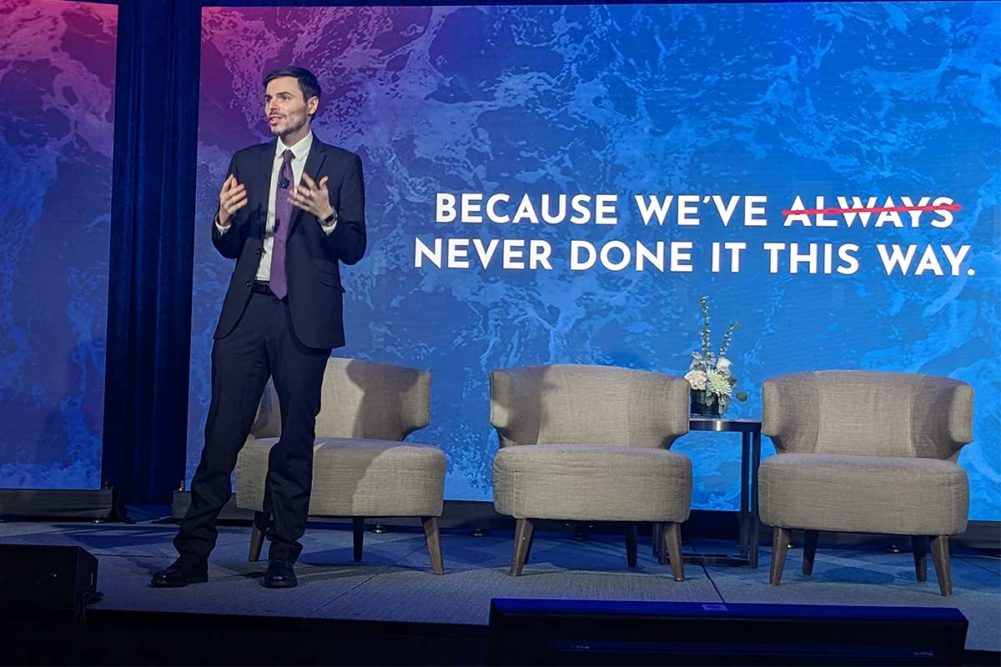AMELIA ISLAND, FLA. — With so many companies in the wholesale baking industry struggling to find reliable and skilled labor to keep production lines running at full capacity, the American Bakers Association (ABA) offered at least one solution through an often untapped segment of the workforce: refugees. At the ABA Convention, held March 26-29 in Amelia Island, Fla., the association welcomed Yaron Schwartz, director for the US at the Tent Partnership for Refugees, to share with attendees how they could gain loyal and talented employees while making a difference for this community. help make a difference for this community through employment.
Tent aims to empower large companies to leverage their business operations to connect refugees to work by focusing on three main areas: hiring, training and mentoring refugees. In addition, Tent works with companies to generate job opportunities for refugees through their supply chains, via its UNSTUCK initiative that partners with brands to develop products sourcing from suppliers hiring refugees.
Since 1980, the United States has welcomed more than 3 million refugees into the country – including, over the past 18 months, 100,000 Ukrainians and 85,000 Afghans fleeing violence in their home countries. The Biden administration has also pledged to welcome hundreds of thousands of forcibly displaced people from all over the world through the traditional refugee resettlement program and new humanitarian parole programs.
“Given that the U.S. has welcomed hundreds of thousands of refugees, there is an exciting opportunity for businesses to step up and help economically integrate refugees into the U.S. by hiring them ,” Mr. Schwartz explained.
One of the benefits for companies working with refugees, he went on, is that this population is legally allowed to work in the United States. The U.S. government provides refugees with their work authorization documents, meaning that responsibility does not fall to the employer.
However, refugees can face structural barriers to employment including a lack of a US-based professional network as well as language and transportation barriers. Hiring processes might even screen these candidates out of the hiring process due to gaps in resumes or foreign education and professional experiences.
“These employees won’t necessarily join your workforce through the traditional means,” Mr. Schwartz explained. “Hiring refugees will often require you to be more intentional about seeking them out.”
That’s where Tent comes in. The organization advises large companies on locations to prioritize for its refugee hiring efforts and helps companies identify roles in the organization that would be well-suited for refugee job candidates. Tent then connects companies with local organizations that can help recruit and integrate talent as they’re hired.
Tent also offers training to human resources teams on how to engage with this community, bridge gaps and address barriers.
During his presentation, Mr. Schwartz laid out the business case for hiring refugees through three key points: refugees are a loyal workforce, consumers like buying from companies who support refugees, and other employees like working for companies who do good in this world. By supporting this community, the baking industry has an opportunity to not only fill its workforce gap but also gain credibility with both consumers and employees.
When refugees find a workplace that supports them, Mr. Schwartz explained they tend to feel gratitude and loyalty toward that employer. Tent research conducted with the Fiscal Policy Institute surveyed approximately 30 companies in the United States that had hired refugees. The research found that in the manufacturing sector alone, the turnover rate for the refugee population was only 4%, compared to an 11% industry average.
“When refugees find a place that is committed to supporting them, especially after going through a period of instability in their lives, they’re often very grateful and are willing to stay at a company for the long-term,” he said. “I know that many in this industry are experiencing high turnover right now, and I know that through hiring refugees, if you’re able to provide a welcoming environment, they will stay in your business long-term and be a wonderful source of talent for your organization.”
When it comes to consumers, Tent research conducted with New York University’s Stern School of Business found that 63% of U.S. consumers said they would be more likely to buy a product from a company that had agreed to support refugees.
“Consumers are looking for companies to take a stand on social issues, like refugees,” Mr. Schwartz said. “And we see that these percentages of consumers who are more likely to buy products from companies that are supporting refugees are the highest among millennials and Gen Z consumers. Supporting refugees and being public about your support can really build your brand reputation with these consumers.”
Having a refugee employment program also helps companies recruit and retain employees from other groups. A Tent study of German companies — Tent works with companies around the world — showed that employees found that companies that employed refugees were more attractive, and prospective employees felt similarly.
“Hiring refugees helps this population find employment, better integrate into society, and build those lasting and important social and professional bonds that will help them succeed. But hiring refugees is also really good for your business leading to higher retention rates, improved consumer perceptions and increased employee engagement opportunities,” Mr. Schwartz said.
Readers can expect to see more introductions to resources like TENT being provided by ABA as part and parcel of their commitment to provide solutions to workforce challenges faced by the wholesale baking industry.






